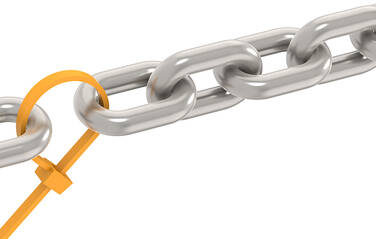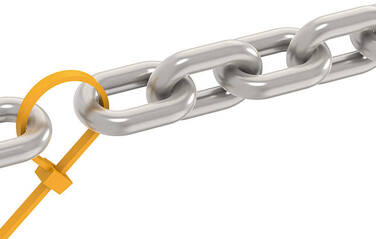To understand whether the tensile strength of cable ties is important, we first have to understand what it is and how it is measured. Our latest guide explains all you need to know to buy the right cable ties for the job.
What does tensile strength mean?
Tensile strength is the phrase used when discussing how strong a cable tie is. Tensile strength is expressed in kilograms, for example 25 kg, and refers to the maximum weight, or load capacity, a cable tie can bear safely before it will break. While some cable ties may bear more weight, tensile strengths given are a baseline for safety conditions.
Loop tensile strength
Loop tensile strength refers to the load capacity of a cable tie fastened into a loop. As with tensile strength, loop tensile strength is given in kilograms and indicates how much weight is needed to compromise an assembled cable tie.
Why tensile strength is important
If you wouldn’t hang a picture on your wall with a picture hook that couldn’t take the weight, why would you use a cable tie that wasn’t strong enough to safely carry the weight of its load? Although there are many times when a cable tie doesn’t need a high tensile strength, for example when being used to manage home computer cabling to keep them neat and tidy, there are situations where a strong enough cable tie must be used. For example, where overhead safety netting is secured in place, failure of the cable ties could result in serious damage or injury to passers-by.
What if the tensile strength is too low for the load?
Tensile strength measures the maximum load capacity of a single cable tie. Thus, where the load exceeds the tensile strength of a cable tie, multiple cable ties can be linked to give a combined tensile strength that is sufficient for the load. So where a single, heavy duty cable tie with a tensile strength of 160kg is insufficient to take the weight of a pipe weighing 320kg, two of the same cable ties would have a combined tensile strength equal to the weight of the pipe (2 x 160kg = 320kg), and could be used together.
Do all cable ties have the same tensile strength?
The short answer to this is no, they don’t! Stainless steel, metal cable ties are stronger than nylon cable ties and as a general rule of thumb, the wider the cable tie, the greater its tensile strength.
Tensile strength of nylon cable ties
|
Size of cable tie |
Tensile strength |
|
80mm x 2.5mm |
8kg |
|
All other 2.5mm |
8.1kg |
|
All 3.6mm wide |
18.2kg |
|
All 4.8mm wide |
22.2kg |
|
All 7.6mm wide |
54.4kg |
|
All 9mm wide |
79.4kg |
|
All 12.7mm wide |
114kg |
Tensile strength of metal cable ties
|
Size of cable tie |
Tensile strength |
|
All 4.6mm wide |
89kg |
|
All 7.9mm wide |
160kg |
Tensile strength of UV & heat stabilised cable ties
|
Size of cable tie |
Tensile strength |
|
All other 2.5mm |
8kg |
|
All 3.6mm wide |
18kg |
|
All 4.8mm wide |
22kg |
|
All 7.6mm wide |
55kg |
|
All 9mm wide |
80kg |
|
All 12.7mm wide |
114kg |
Cable ties for scaffolding from cableties-online
Perfect for securing the debris netting and heavy duty plastic netting that protect passers-by from debris falling from scaffolding, our 4.8mm wide X 300mm nylon 6/6 cable ties are available in packs of 100 and are offered with generous volume discounts for bulk buys. For more details, call us on 01623 412160 or send the team an email to sales@cableties-online.co.uk








